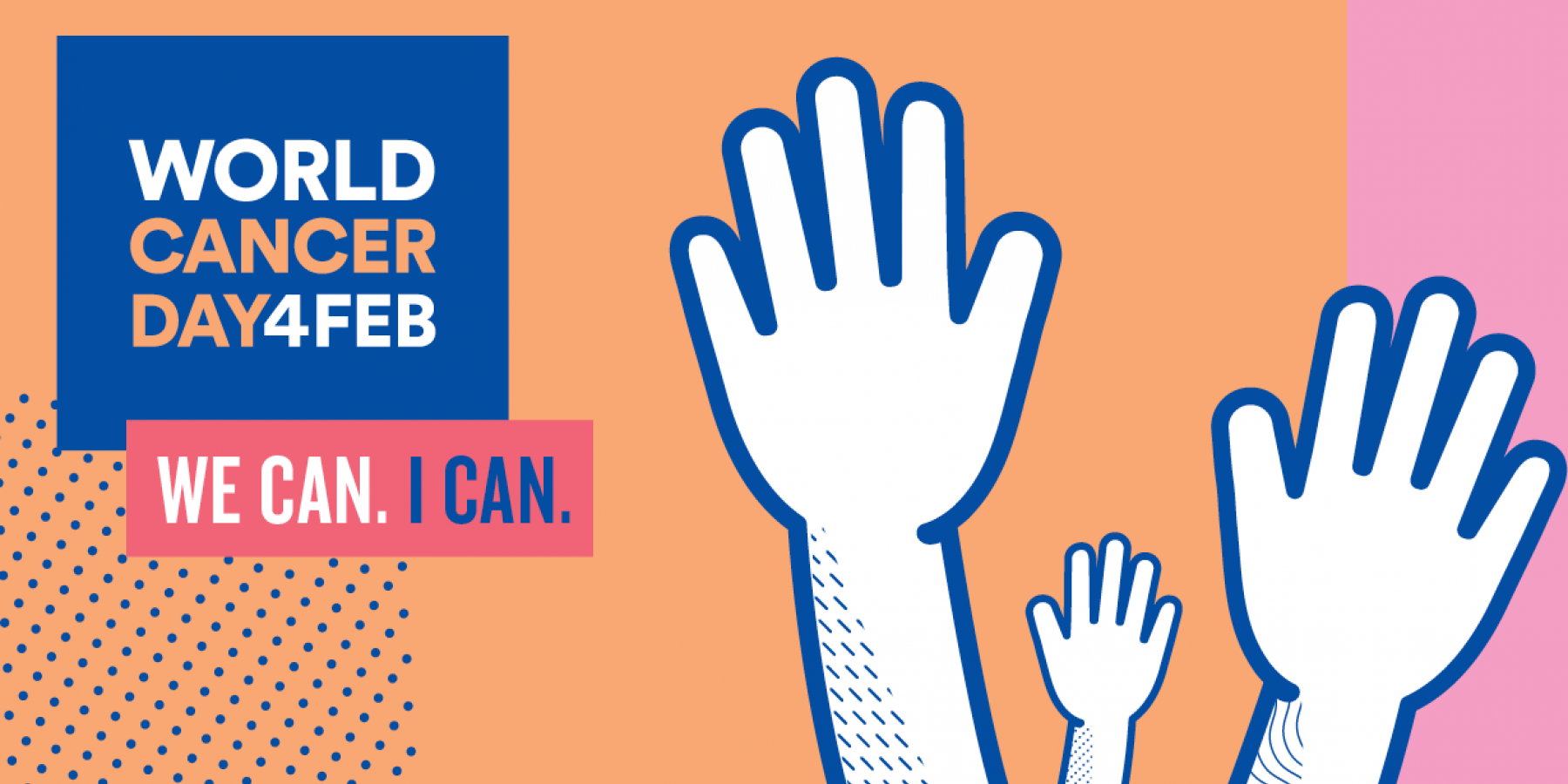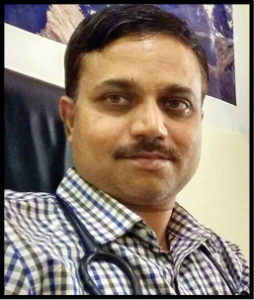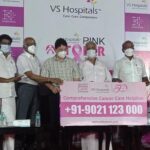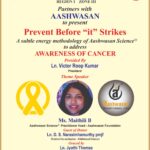

“We Can. I Can”- Unite to fight against cancer. World Cancer Day unites the world’s population to fight against cancer and rise awareness against cancer among people, about healthy diet and physical activity. 2016-2018 is held under the theme “We Can. I Can” Unite to fight against cancer
Cancer, one of the most deadly challenges in 21st century, is fast spreading worldwide; it has now emerged as 2nd top leading causes of death, Heart disease being the first top cause.
Along with human growth in terms of modernization and urbanization the cancer too grew to a greater extent with respect to types, complexity, involving people from all race, regions and age.
World cancer day Feb-2018
February 4th of every year is celebrated as “World Cancer Day” globally since 1933 under the direction of UICC (Union for International Cancer Control) and WHO. World Cancer Day unites the world’s population in the fight against cancer. This day was established specially to rise awareness against cancer among people, teaching them about healthy diet, regular and proper physical activity and a lesson on how to prevent themselves from the environmental carcinogens. The campaign for years 2016-2018 is held under the theme “We Can. I Can”.
‘We can, I Can.– is a theme adopted for three years 2016-2018, it explores how everyone-as a collective or as an individual-can do their part to reduce the global burden of cancer.
Just as cancer affects everyone in different ways, all people have the power to take various actions to reduce the impact that cancer has on individuals, families and communities.
World Cancer Day is a chance to reflect on what you can do, make a pledge and take action. Whatever you choose to do ‘We can. I can.’ make a difference to the fight against cancer.
What is Cancer?
Cancer is a generic term for a large group of diseases that can affect any part of the body. Other terms used are malignant tumours and neoplasms. One defining feature of cancer is the rapid creation of abnormal cells that grow beyond their usual boundaries, and which can then invade adjoining parts of the body and spread to other organs, the latter process is referred to as metastasizing. Metastases is a major cause of death from cancer.
Cancer statistics -worldwide
- As per a recent WHO report, 8 million people worldwide died from cancer in 2015. That is nearly 1 in 6 of all global deaths.
- US$1.16 trillion is the estimated total annual economic cost of cancer in 2010.
- 30-50%of cancers could be prevented.
Cancer statistics – India
- One woman dies of cervical cancer every 8 minutes in India
- For every 2 women newly diagnosed with breast cancer, one woman dies of it in India
- As many as 2,500 persons die every day due to tobacco-related diseases in India
- Smoking accounts for 1 in 5 deaths among men and 1 in 20 deaths among women, accounting for an estimated 9,30,000 deaths in 2010
According to the statistics, it has been noted that most of the cancer cases and cancer deaths (47% and 55% respectively) occur in less developed areas of the world. If it is not controlled, this condition may get worse by 2030. So, it is very necessary to get control over such situation at all the corners of the world.
Cancer Fact sheet- India
- There are more than 100 types of cancers; almost any part of the body can be affected.
- The five most frequent cancers (ranking defined by total number of cases) in India in men and women are breast, cervical, oral cavity, lung and colorectal.
- Cancer is the second most common cause of death in India (after cardiovascular disease).
- Use of tobacco products (e.g. smoking cigarettes) are the single most preventable cause of death worldwide.
- More women in India die from cervical cancer than in any other country.
- Breast cancer is the most common cancer in women in India and accounts for about a quarter of all cancers in women in Indian cities.
- The average age for breast cancer in India is almost a decade lower than that in the West.
- Cancers of major public health relevance such as breast, cervical, oral and colorectal cancer can be cured if detected early and treated adequately.
- Cancers of the oral cavity as well as lung cancers due to chewing or smoking tobacco can be prevented.
- Cancers of oral cavity and lungs in males and cervix and breast in females account for over 50% of all cancer deaths in India [9].
Common myths and facts about cancer
Below are listed some common myths and facts about the cancer among people which are necessary to be removed and to understand the reality about the cancer to get control over it.
- Generally people think that cancer tissues are just healthy tissue, however it is not.
- Common people think that cancer is a disease for wealthy and old age people however; it is a global and epidemic disease which can affect all age groups.
- Common people think that suffering from the cancer is like a punishment however, most type of cancers are now treatable.
- Common people think that having cancer is their fate however approximately 30% of the cases can be cured and prevented.
Higher the Income Higher the chances of Cancer
- A survey conducted by WHO in 2015 shows that people belonging to upper-middle class and rich categories suffer with cancers of stomach, liver, colon & rectum and breast cancers compared to poor and low economic class people.
- This demonstrates clearly that occurrence of cancer is more common in rich, though the deaths due to cancer is more seen in people with low economy due to insufficient knowledge and money to get timely treatment.
What causes cancer?
Cancer arises from the transformation of normal cells into tumor cells in a multistage process that generally progresses from a pre-cancerous lesion to a malignant tumor. These changes are the result of the interaction between a person’s genetic factors with 3 categories of external agents, such as:
- physical carcinogens, such as ultraviolet and ionizing radiation;
- chemical carcinogens, such as asbestos, components of tobacco smoke, aflatoxin (a food contaminant), and arsenic (a drinking water contaminant); and
- Biological carcinogens, such as infections from certain viruses, bacteria, or parasites.
- Tobacco use, alcohol use, unhealthy diet, and physical inactivity are major cancer risk factors worldwide.
- Ageing is another fundamental factor for the development of cancer.
Can we prevent Cancer?
Between 30–50% of cancers can currently be prevented by avoiding risk factors and adopting healthy life style. Early detection of cancer plays a major role in cancer management. See the picture depicting the warning signs of cancer which should be immediately brought to the attention of the physician. Many cancers have a high chance of cure if diagnosed early and treated adequately.
Role of Diet in Cancer
There is a famous saying in Kannada –ಊಟ ಬಲ್ಲವನಿಗೆ ರೋಗವಿಲ್ಲಾ, which means one who knows what to eat, how to eat, how much to eat, when to eat usually is free from disease.
Foods that Increase Cancer Risk
- 1 out of 10 cancers (10%) may be linked to diet and over half of these are caused by eating less than 5 portions of fruit and vegetables a day.
- A diet rich in saturated fats, red meat and salt and poor in fiber is associated with increased risk of cancer. The people who eat more of red and processed meats are more likely to develop stomach and bowel cancers.
- The way we cook might also increase our cancer risk. Chemicals are released when we cook food at high temperatures which can damage body cells putting them at risk of becoming cancerous.
- Some studies have shown that the calcium in milk reduces the risk of bowel cancer, while others have linked high intake of dairy proteins with prostate cancer.
- Most additives, colors, flavors and sweeteners have not been found to increase the risk of cancers.
- Alcohol and pickled food consumption have been shown as independent risk factors for stomach cancers. Alcohol can increase the risk for a number of cancers including that of liver, mouth, bowel, throat, food pipe and breast.
- Other Indian foods associated with cancer risk are high rice intake, spicy food, and excess chilly consumption, use of soda and consumption of dried salted fish.
Foods that Reduce Cancer Risk
- Insoluble grain fiber in coarse grains (e.g., rye, sorghum, maize, barley and millets).
- Micronutrients like vitamins and trace elements.
- Vitamins A, E, and trace minerals such as selenium, zinc.
- Vitamin-D and calcium are also found to give protection against colorectal cancer.
- Green tea and its compounds.
- Retinoids (found in orange and red vegetables and fruits like sweet potatoes, mangoes, pumpkins, peaches and carrots) have been found to inhibit cancer growth in epithelial tissues.
National Institute of Nutrition (NIN) recommends a diet that includes high intake of fresh vegetables, fruits, garlic and spices such as turmeric in adequate amounts for cancer prevention.
Cancer treatment — calling all Pathies to be united and adopt an Integrated approach….
I would like to quote this — “The Physician’s high and only mission is to restore sick to health, to cure, as it is termed”, a quote from a book known as ‘Organon of Medicine, which tells about the fundamental principles, disease understanding, medicinal powers and application of medicinal knowledge to treat diseases through Homeopathy, which was written by 18th century German, Allopathic doctor Dr. Samuel Hahnemann who founded system of Homeopathy later.
As per this quote the main aim of the doctor is to cure the sick, to get him out of his suffering, which demands all kinds of skills and knowledge to be employed by physicians. A good willed doctor, who is concerned about patient’s welfare, should never hesitate to adopt/suggest a multidisciplinary approach in the challenging cases like cancer. Oncologists should work together with AYUSH physicians and vice versa. I am sure such an approach will definitely benefit cancer patients.
Unfortunately the current scenario is such that doctors of AYUSH and Modern Medicine have become rivals, we should realize that DISEASE is our common Rival who is growing stronger and we are losing our strength as Health care providers. Unless we unite and fight against challenging diseases like Cancer, Auto immune diseases etc, we will lose the respect from suffering humanity.
Role of AYUSH (Ayurveda, Unani, Siddha & Homeopathy) systems in the treatment of Cancer.
Ayurveda is the most ancient system of medicine, It can be said that almost all systems of medicine including Modern medicine have their roots in Ayurveda.
“Gatra pradeshe kwachidev doshaaha
Sammruchhita manasamasruk pradushya
Vruttam sthiram mandrujam
Mahantamanalpamulam chirvruddhyapakam
Kurvanti mansocchrayamtyagaadham
Tadarbudam shastravido vadanti.
This Shloka which tells about cancer (Arbuda in Sanskrit) is mentioned in ancient Ayurvedic literature called Sushruta Nidanastahan which says—
Due to vitiation of the flesh and blood by deranged and aggravated Doshas (vayu, pitta and kapha) a large vegetation of flesh appears at any part of the body which becomes rounded, immovable, slightly painful and has its root considerably deep in the flesh (affected part). This growth is termed as ARBUD by the learned physician.
Homeopathy system of medicine has adopted holistic approach towards diseases like cancer. Homeopathy doesn’t consider cancer just as a pathological change in tissues or organs. A true homeopath assesses why a particular person is prone to cancer and why not others? It looks beyond tissue changes, laboratory findings.
According to Homeopathic concept, cancer is one of the manifestations of Syphilitic Miasm. (Miasm- A predisposition to disease).
How Homeopathy can be helpful ?
- Early stages of cancer can be effectively treated though Homeopathy
- Homeopathy can work in sync with other pathies to optimize the effects, so that cancer patients can be benefited to a larger extent.
- In terminal cases of cancer, where only palliative treatment is the choice, homeopathy can be considered as a main mode of treatment, as homeopathic medicines in minute doses do not cause any side effects.
- Homeopathy can be useful to counteract the side-effects of chemotherapy and radiotherapy ( e.g.- nausea, vomiting, loss of appetite, weight loss, Hair loss, Anemia infections etc)
- Homeopathy can be useful in cancer patients where certain allopathic medicines are contraindicated.
Yoga & Naturopathy– the benefits of yoga and naturopathy methods is well known. The secret of longevity and healthy life of our ancestors is due to yoga and Naturopathic practices they adopted in their life. Healthy food habits and healthy practices definitely help to optimize our physical and mental health, thus can play a major role in prevention as well as in the treatment of cancer patients.
Siddha and Unani systems of medicine too can offer good benefits through their treatment for cancer patients. The healing properties need to be explored more and brought into the light.
So friends cancer is no more a dreaded disease, it can be prevented, early detection and treatment can cure it, and a cancer patient can live a long and happy life like anyone.
The medical fraternity, government authorities, private bodies and likeminded individuals and doctors should come forward and get united only then can we defeat this common enemy i.e., cancer and help thousands of people suffering from cancer.


Dr. Tejaswi K.P.
Reader- Dept. of Surgery, Bhagwan Buddha Homeo Medical college, Mallathalli, Bangalore
Consultanat- Surabhi Homeo clinic, Vidyaranyapura, Bangalore-97
Mob-97311 33819 Email-drtejas2000@rediffmail.com











